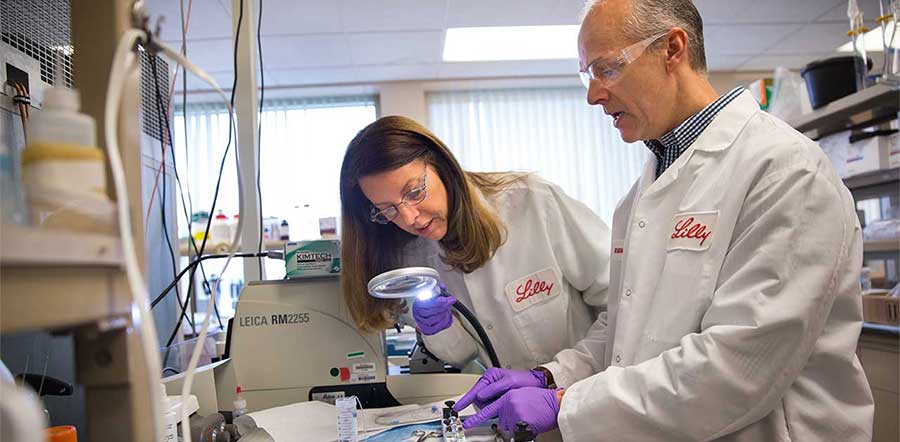Clinical Trials
Why are Clinical Trials Important?
A clinical trial is a scientific study that helps determine if and how a medicine works in people. Every clinical trial participant provides valuable information that might help improve medical research and knowledge. Through clinical trials, we are given the chance to discover new and improved medicines to make life better for people around the world.
Our Commitment
At Lilly, we have a long history of commitment to transparency and the sharing of data. We know that transparency and data sharing is crucial in enhancing public health, safeguarding the privacy of patients, respecting the integrity of national regulatory systems, and maintaining incentives for investment in biomedical research.
In 2004, Lilly became the first company to voluntarily disclose the initiation of our clinical studies and post study results in a publicly available registry. Since the start of 2014, Lilly has enhanced our transparency initiatives in alignment with the PhRMA/EFPIA Principles for Responsible Clinical Trial Data Sharing.
We continue to share clinical trial results of all sponsored Phase I, Phase II, Phase III and Phase IV clinical trials of Lilly marketed products conducted anywhere in the world on the US clinical trials database at clinicaltrials.gov regardless if the data was favourable or not. Additionally, we provide updates to the European database at clinicatrialsregister.eu regarding many aspects of clinical research and development, including the location of where clinical studies are being conducted.
Lilly also seeks to publish study results – both positive and negative – through other channels, such as peer-reviewed journals and scientific conferences.
Association of Medical Research Charities Partnership
The COVID-19 pandemic powerfully demonstrated the benefits of clinical research for both patients and the NHS. In February 2021, in partnership with the Association of Medical Research Charities (AMRC), Lilly brought together key stakeholders from across government, patient groups, and the NHS to discuss how to strengthen the UK’s clinical research capabilities. The discussion focused on ways to embed research into the core of the NHS, streamline the set-up and delivery of new clinical trials, and increase diversity in clinical research.
Both speed and consistency are needed in setting up new studies in the NHS, with data showing that the UK is five times slower than the US and twice as slow as Poland to set-up new clinical trials 1. The discussion touched on ways this could be improved, including by encouraging the use of standardised costing and contracting frameworks to accelerate the process of trial set up across multiple NHS sites. Additional recommendations discussed included stipulating “protected research time” to better support busy healthcare professionals who want to engage in research projects, as well as encouraging more widespread use of digital and remote technologies to help lower barriers to patient participation and engage broader and more diverse patient populations in research.
Lilly UK Clinical Trials
Between 2019 and end of 2023, we have invested £535 million in our UK research operations. We currently have 50 clinical trials ongoing across 260 study locations, in areas including diabetes, oncology, immunotherapy, pain and neurodegeneration.
Diversity in Clinical Trials
Responses to medicines can vary depending on a number of factors, including someone’s genetic background, ethnicity, gender and lifestyle.
This is why it’s critical for Lilly to have diverse representation in clinical trials – to gain the insights necessary to make medicines that will be the most effective for all people who use them.
Minority populations have been historically and consistently underrepresented in clinical trials. As a result, important information about how medicines work in minority populations is not always available. In response, Lilly has developed a clinical trial diversity strategy to better understand patient differences that may affect clinical outcomes. The ultimate goal of our clinical trial diversity strategy is to improve health outcomes for individual patients.
Independent Clinical Research
In addition to sponsoring our own clinical research and research collaborations, Lilly has programs for considering external requests for Lilly provision of study drug and/or financial support for independent clinical research that is initiated, designed and sponsored by external researchers.
Lilly considers such requests for support of independent clinical research projects based on scientific merit and strategic fit with Lilly’s areas of research interest. These reviews are carried out by global committees composed of Lilly medical and scientific staff members from relevant therapeutic areas.
Healthcare and research professionals may submit a concept online.
Research and Scientific Discovery
Research and Scientific Discovery
Principles of Medical Research
Principles of Medical Research
1) Duffy, D., 2020. Covid-19: The catalyst for UK clinical research? Hospital Times. Available at: https://www.hospitaltimes.co.uk/covid-19-catalyst-for-uk-clinical-research/

